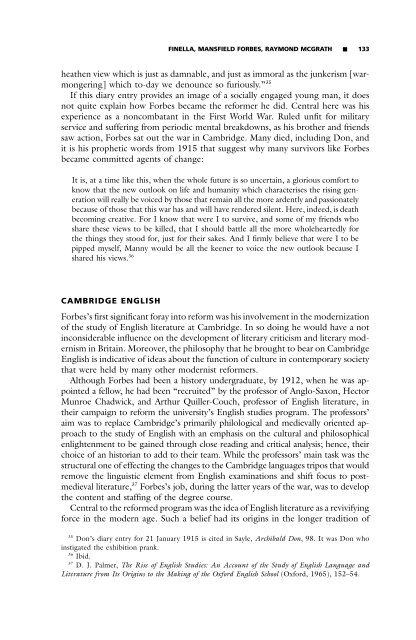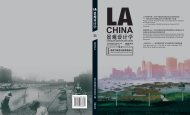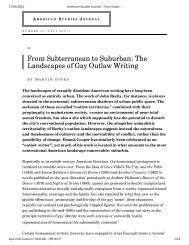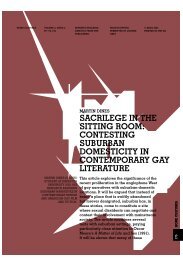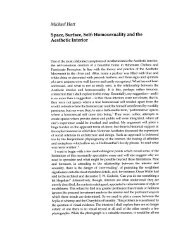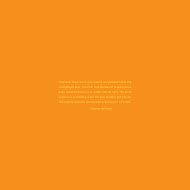Finella, Mansfield Forbes, Raymond McGrath, and ... - Fritz Haeg
Finella, Mansfield Forbes, Raymond McGrath, and ... - Fritz Haeg
Finella, Mansfield Forbes, Raymond McGrath, and ... - Fritz Haeg
Create successful ePaper yourself
Turn your PDF publications into a flip-book with our unique Google optimized e-Paper software.
FINELLA, MANSFIELD FORBES, RAYMOND MCGRATH 133<br />
heathen view which is just as damnable, <strong>and</strong> just as immoral as the junkerism [warmongering]<br />
which to-day we denounce so furiously.” 35<br />
If this diary entry provides an image of a socially engaged young man, it does<br />
not quite explain how <strong>Forbes</strong> became the reformer he did. Central here was his<br />
experience as a noncombatant in the First World War. Ruled unfit for military<br />
service <strong>and</strong> suffering from periodic mental breakdowns, as his brother <strong>and</strong> friends<br />
saw action, <strong>Forbes</strong> sat out the war in Cambridge. Many died, including Don, <strong>and</strong><br />
it is his prophetic words from 1915 that suggest why many survivors like <strong>Forbes</strong><br />
became committed agents of change:<br />
It is, at a time like this, when the whole future is so uncertain, a glorious comfort to<br />
know that the new outlook on life <strong>and</strong> humanity which characterises the rising generation<br />
will really be voiced by those that remain all the more ardently <strong>and</strong> passionately<br />
because of those that this war has <strong>and</strong> will have rendered silent. Here, indeed, is death<br />
becoming creative. For I know that were I to survive, <strong>and</strong> some of my friends who<br />
share these views to be killed, that I should battle all the more wholeheartedly for<br />
the things they stood for, just for their sakes. And I firmly believe that were I to be<br />
pipped myself, Manny would be all the keener to voice the new outlook because I<br />
shared his views. 36<br />
CAMBRIDGE ENGLISH<br />
<strong>Forbes</strong>’s first significant foray into reform was his involvement in the modernization<br />
of the study of English literature at Cambridge. In so doing he would have a not<br />
inconsiderable influence on the development of literary criticism <strong>and</strong> literary modernism<br />
in Britain. Moreover, the philosophy that he brought to bear on Cambridge<br />
English is indicative of ideas about the function of culture in contemporary society<br />
that were held by many other modernist reformers.<br />
Although <strong>Forbes</strong> had been a history undergraduate, by 1912, when he was appointed<br />
a fellow, he had been “recruited” by the professor of Anglo-Saxon, Hector<br />
Munroe Chadwick, <strong>and</strong> Arthur Quiller-Couch, professor of English literature, in<br />
their campaign to reform the university’s English studies program. The professors’<br />
aim was to replace Cambridge’s primarily philological <strong>and</strong> medievally oriented approach<br />
to the study of English with an emphasis on the cultural <strong>and</strong> philosophical<br />
enlightenment to be gained through close reading <strong>and</strong> critical analysis; hence, their<br />
choice of an historian to add to their team. While the professors’ main task was the<br />
structural one of effecting the changes to the Cambridge languages tripos that would<br />
remove the linguistic element from English examinations <strong>and</strong> shift focus to postmedieval<br />
literature, 37 <strong>Forbes</strong>’s job, during the latter years of the war, was to develop<br />
the content <strong>and</strong> staffing of the degree course.<br />
Central to the reformed program was the idea of English literature as a revivifying<br />
force in the modern age. Such a belief had its origins in the longer tradition of<br />
35<br />
Don’s diary entry for 21 January 1915 is cited in Sayle, Archibald Don, 98. It was Don who<br />
instigated the exhibition prank.<br />
36<br />
Ibid.<br />
37<br />
D. J. Palmer, The Rise of English Studies: An Account of the Study of English Language <strong>and</strong><br />
Literature from Its Origins to the Making of the Oxford English School (Oxford, 1965), 152–54.


